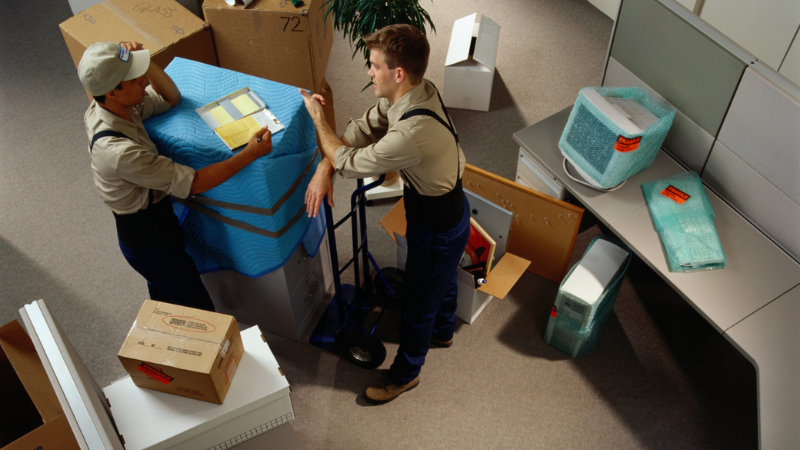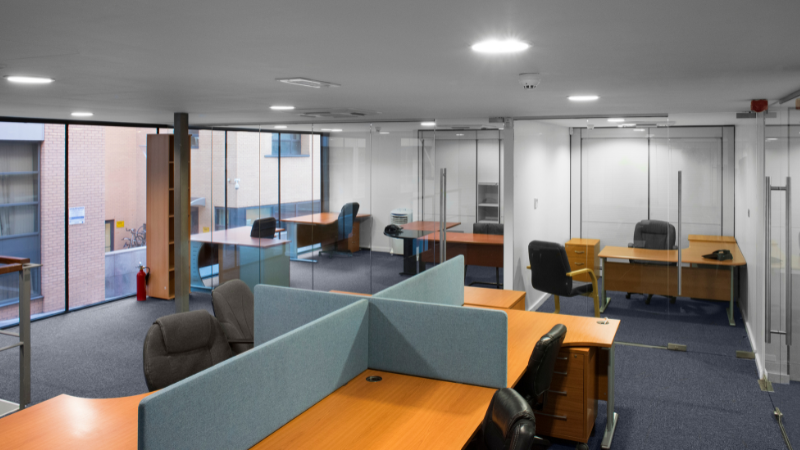
Avoid These Office Moving Mistakes
Avoid These Office Moving Mistakes
Written by Chicago Office Movers on . Posted in Corporate Relocation, Moving Tips

Corporate relocations are on the rise as hybrid work increases and labor shortages mount. Any major business move requires extensive, strategic planning. While planning an office move, tread carefully, as making these ten common mistakes can increase the stress factor of the relocation.
Companies move for numerous reasons. Some may find the talent pool attractive in larger cities, like Chicago, and prioritize moving there. Other major corporations find urban areas rife with crime and struggle to hire skilled professionals, therefore moving out of the big cities.
Businesses may also expand their product or service offerings, which necessitates additional workspaces and larger production facilities. On the other hand, companies may have plans to downsize and seek a smaller, more economical building in which to continue business operations.
Whatever the reason for relocating the business, it is not an easy decision to make. Nevertheless, taking the company to a location where opportunities abound can boost employee morale. Greener pastures can be on the horizon for companies on the move. But it’s important to avoid these moving mistakes.
Mistake 1: Insufficient planning
Planning well in advance of the expected relocation date is critical to the success of the move. Set aside a few weeks to involve employees in the move and keep moving costs down. Assign dependable employees a role to facilitate specific parts of the move.
Mistake 2: Not taking inventory
Costly mistakes can arise when businesses fail to take an accurate inventory of the goods in the office. Without an inventory list, staff will struggle to ensure the right goods are moved correctly. Record all items moving to the new office as well as their locations in the new building.
Record the conditions of the items on the inventory list. The condition of high-end equipment should especially be noted. If the pricey equipment is damaged during the move, the business owner can hold the commercial mover accountable and streamline insurance claims.
Mistake 3: Failing to include IT staff
IT systems are crucial to today’s businesses. Setup of technology equipment will take time and advanced planning, especially since the electrical, network, and space factors could be different in the new office. Ensure the IT leaders see the layout in the new building beforehand and have time to make adaptations.
Mistake 4: Using the wrong moving supplies
Moving boxes come in all sizes. Choosing boxes that are too small or too large can lead to unwanted consequences. Packing small items in an extremely large box that allows significant wiggle room can result in damage to the items. Pick moving boxes with the right size to ensure protection.
Mistake 5: Moving unnecessary goods
Ideally, before the move, a business will donate, sell, or discard office goods that will not be used in the new building. The mistake occurs when this important step is forgotten. Businesses will pay more to move more items and spend time packing items that generate little-to-no revenue.

Mistake 6: Not insuring the move
While a company may have existing insurance, the coverage may fail to cover all the office belongings that will be transported during the move. Accidents are a reality of any move, so it’s necessary to obtain additional coverage from the current insurer or from the moving company.
Mistake 7: Not labeling the boxes
During the flurry of packing, labeling the boxes may be forgotten. Since organization is the key to a successful relocation, label the boxes owned by each employee, the box numbers that correspond to the inventory list, and where the boxes go in the new building.
Mistake 8: Forgetting to turn on utilities
Downtime is expensive for companies. Prevent unproductivity in the new office by setting up the utilities in the new building well in advance. Schedule the internet service provider before the IT equipment is delivered. All operational functions should be in place by moving day.
Mistake 9: Hiring an unprofessional mover
Commercial movers with experience understand how to handle the logistics of a major office move. Business owners who aim for a seamless move are advised to obtain quotes from several moving companies, assessing factors, such as availability, affordability, and industry experience.
Reading reviews is especially valuable for learning about other customers’ experiences with a prospective commercial mover. Choose a mover with the desired qualities. Finding and hiring a reputable mover will eliminate the bulk of stress that comes with relocating the business.
Mistake 10: Not communicating moving requirements
Special requirements may be expected when moving to a new building. The commercial mover should be aware of the availability of an accessible elevator, stairs at the origin and destination or access only through a narrow alleyway. Communicate the logistic of the move and avoid costly surprises.
Avoiding these top ten mistakes can reduce the stress that accompanies a major office move. Another important factor that will provide your business with a seamless relocation is hiring an affordable, highly rated and locally based commercial mover, like Chicago Office Movers.
Work with Chicago Office Movers and streamline your corporate relocation. Our moving crews are unionized, licensed, and experienced to deliver maximum customer satisfaction and the most stress-free move possible. Your items are secure in the hands of our background-checked movers.
Our moving trucks are also designed to protect office goods, whether you are moving down the street or across state lines. Each truck features a climate-controlled space, lift gates, and air-ride suspensions. Business customers utilize a tracking system to track their goods as they move.
Chicago Office Movers provides comprehensive moving services. As a leading office mover, we offer not only packing and unpacking services, but also short- and long-term storage options, insurance and service contracts, sturdy boxes, and professional help with planning your office relocation.
Whether you plan to move delicate antiques, fragile IT systems or bulky office furniture, Chicago Office Movers has the experience to make your relocation dreams a reality. Choose us for a budget-friendly move.
Contact our Chicago office today at 312-244-2246 for an upcoming local, long-distance or international move.
Contact Us
Related Services
- Corporate Moving
- Commercial Moving
- Reliable Commercial Storage
- Specialty Commercial Moving
- Furniture Assembly
- Movers for Office Renovation
- Machinery Moving
- Library Moving
- Lab Moving
- Server Room Moving
- Office Movers in Rosemont, IL
- Commercial Moving in Bolingbrook, IL
- Commercial Movers in Naperville, IL
- Commercial Movers in Des Plaines, IL
- Commercial Moving Services in Aurora, IL
- Schaumburg Office Movers
- Commercial Moving Services in Oakbrook, IL
- Commercial Movers in The North Shore
- Commercial & Office Moving Services Deerfield, IL
- Commercial & Office Movers in Hinsdale, IL
- Elk Grove Village Commercial Movers
- Furniture, Fixtures and Equipment Services
- Commercial Mover in Lincolnshire, IL
- Office Packers in Lincolnshire, IL
- Office Decommissioning in Lincolnshire, IL
- Professional Movers in Downers Grove, IL
- Moving Company in Chicago, IL









 A final tip for first-time office renters is partnering with a
A final tip for first-time office renters is partnering with a 








